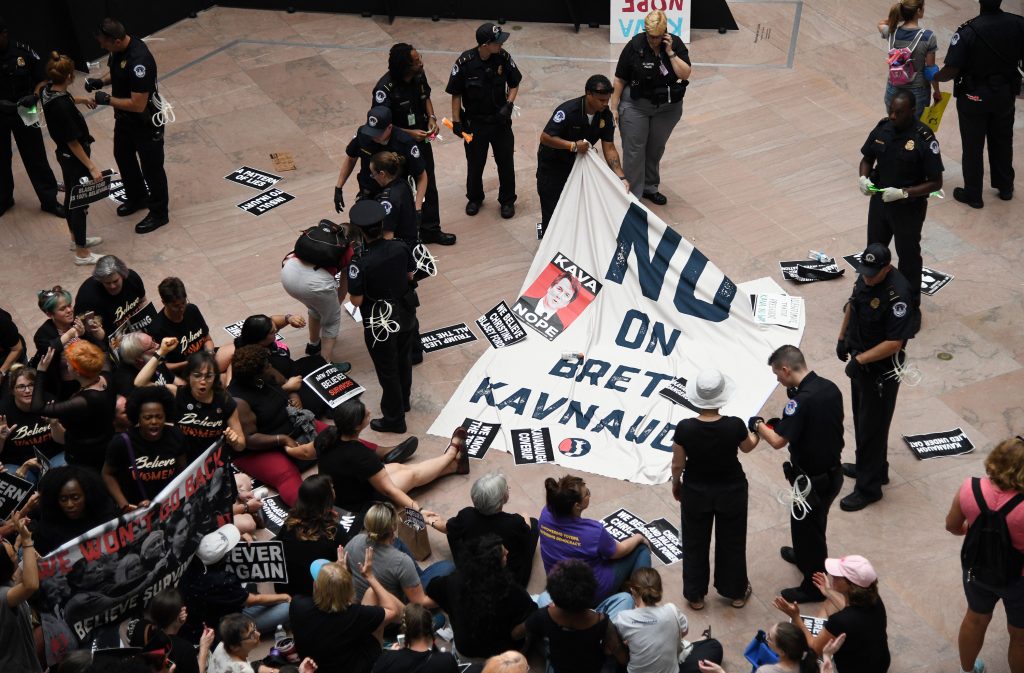
Last Thursday, we saw a woman of dignity, composure and courage describe the worst moment of her life. I can’t imagine what reserves of spirit it took for Christine Blasey Ford to speak before 21 senators, half of them relentlessly hostile, and millions of people outside the cramped room of the Senate Judiciary Committee. I cannot say for a certain fact that the story she told about her sexual assault was accurate in every respect, and were I sitting on a trial jury for her accused assailant, Brett Kavanaugh, I would be unable to convict him on the basis of the evidence thus far disclosed. But I found Blasey utterly truthful, and what I cannot prove I must say I do believe. I know that such a story had never been told before outside a courtroom, a confessional or a therapist’s office. I don’t think this country will ever be the same after it. As the husband of an abuse victim myself, I know that I won’t.
Should all this, though, disqualify Kavanaugh from the Supreme Court? The argument has been made that he is sitting for a job interview, not in jeopardy of his career or, like Bill Cosby, his freedom. He has, that is, neither an absolute entitlement nor an absolute liability; it is sufficient that his accuser is credible, and that what others have attested raises serious questions about his character. His own obnoxious and revolting Senate testimony, particularly the contemptuous attitude he displayed toward the women who questioned him, would I think suffice to scuttle him for any position of responsibility, let alone one that would enable him to rule on questions affecting his fellow countrymen. Still, is it quite fair to judge a man by one bad, even very bad day; by a single uncorroborated accusation; and by hearsay countered by glowing testimonials to the contrary and a supportive rating by the principal body of his peers, the American Bar Association? To be sure, to sit on the Supreme Court is not an entitlement; but neither is it any job. A nomination for it carries weight, and should not be dismissed without substantial and substantiated cause.
Such a stipulation actually makes the case easier, however — far easier. To begin with, had Barack Obama’s last Supreme Court nominee, Merrick Garland, not been refused a hearing of any kind out of hand by the Republican Senate majority, there would have been no open seat on the court for Kavanaugh to occupy. That wasn’t bad manners, or hardball politics. It was a violation of the very framework of our political order. A president has the duty and responsibility to nominate a justice for any federal vacancy and the Congress has a corresponding duty to act by accepting or rejecting it. For Congress to refuse this duty is to deny a president one of the most important powers of his office, and where such an action directly impacts the function of the third, coequal branch of government, it creates a constitutional crisis. The crisis remains unresolved, and the precedent will almost surely come up should Kavanaugh not be confirmed and the Democrats regain control of the Senate in the coming election. It might be added that Kavanaugh himself had described Garland as “supremely qualified” when his nomination was announced. You might think that a person of some integrity would decline to stiff a colleague on his own behalf, let alone to deepen a major crisis. Of course, we are talking about Washington, D.C., and about Brett Kavanaugh.
Kavanaugh began his career as a zealot pursuing conspiracy theories in the case of Vince Foster, an aide in the Clinton White House who committed suicide. He joined the staff of Kenneth Starr in hunting Clinton himself, but then, working for the administration of George W. Bush, who lied us into two wars and shredded due process, he discovered a sudden fondness for the imperial presidency. Well-justified concerns about his suitability delayed his appointment to the federal bench for three years, while he promoted the judicial appointments of two of even Bush’s worst nominees, William Pryor and Charles Pickering. Asked about the latter in Congressional testimony, Kavanaugh falsely denied his role. Despite his role as a senior advisor, he also denied any knowledge of or participation in Bush’s torture of enemy combatants, his indefinite detention of prisoners without trial and charge and his illegal surveillance of tens of millions of American citizens. In this, too, he lied.
By a conspiratorial agreement between the former Bush administration and the present administration of Donald Trump, some 90 percent of the documents pertaining to Kavanaugh’s service to Bush have been withheld from Congressional scrutiny. If Kavanaugh has nothing to hide — if, in short, he is telling the truth — he should be the first to ask for, if not insist upon, the full disclosure of his record. His silence on the subject says it all.
Meanwhile, Kavanaugh’s record on the bench — anti-labor, anti-civil libertarian — is somewhere to the right of Genghis Khan. Of course, this would fit him right in with what would then be the ideological majority on the Roberts Court. Don’t call that ideology conservative, though. It is merely a cover for the interests of the corporate oligarchy that runs the country. There once was a conservatism that represented a political philosophy. Under Teddy Roosevelt, it actually busted trusts. But that is long gone. To elevate Kavanaugh would simply put a rubber stamp on reaction for the indefinite future.
The larger question is the role of the Supreme Court itself in our constitutional order, which is a subject for another day. But Brett Kavanaugh, by the full record of his career, belongs nowhere near any position that defines the law. It’s not in the end what he allegedly did as a 17-year-old to Christine Blasey Ford, as chilling as that story is. It’s what he’s done ever since.

